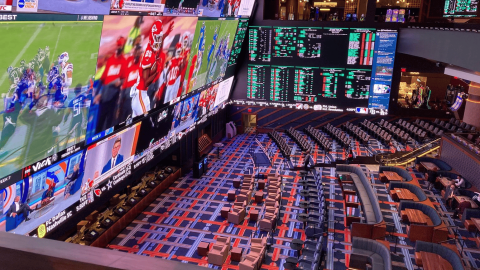Oklahoma's Sports Betting Bill Faces Another Setback Amid Political Discord
Oklahoma’s path to legalizing sports betting has once again hit a legislative roadblock, following the abrupt removal of Senate Bill 585 (SB 585) from a scheduled committee hearing. Despite making strides in the state Senate last month, the bill was pulled just hours before a critical discussion in the House Appropriations and Budget Subcommittee. At the heart of the stalemate is a growing rift between Governor Kevin Stitt and tribal gaming interests, with the former championing an open market, and the latter pushing to maintain exclusive control over wagering operations. The delay underscores Oklahoma’s persistent struggle to align competing visions for gaming regulation.
SB 585 Shelved Moments Before Debate
Efforts to advance SB 585—a measure that would introduce legal retail and mobile sports betting in Oklahoma—have once again been derailed. The bill, which had successfully passed the Senate by a narrow margin, was poised for further evaluation by a House Appropriations and Budget Subcommittee.
However, the subcommittee unexpectedly pulled the bill from its agenda just hours before it was due for deliberation. While this move does not mark the demise of the bill, it casts further uncertainty over its legislative trajectory. Had SB 585 cleared the subcommittee and later the full budget committee, it would have advanced to the House floor for a vote. That opportunity is now on hold.
Tribal Gaming Operators Push for Exclusivity
A significant hurdle for sports betting legislation in Oklahoma has been reconciling the interests of tribal gaming entities, which wield considerable influence in the state’s gambling ecosystem.
Tribes argue that any expansion into sports betting must respect their exclusive rights under current gaming compacts. These compacts, established under federal law, grant tribes the ability to offer various forms of gambling in exchange for revenue-sharing agreements with the state.
SB 585 attempts to walk a fine line by proposing that only federally recognized tribes be allowed to operate retail sportsbooks within their casinos. While the bill leaves room for collaboration with commercial betting operators, it has yet to gain firm support from tribal leaders—who remain cautious about opening the market to external competition.
Governor Kevin Stitt Advocates for a Competitive Market
Governor Kevin Stitt has made it clear that he will veto any measure that enshrines tribal exclusivity in sports betting legislation.
Stitt is pushing for an open and competitive market model, one that mirrors structures in states like Colorado and New Jersey, where commercial operators coexist with tribal and lottery-run sportsbooks. The governor believes that limiting sports betting to tribal operators could stifle innovation and inhibit broader economic benefits.
As of now, three legislative proposals seek to formalize sports wagering, but all favor tribal exclusivity. Without significant amendments, Stitt’s veto threat remains a formidable obstacle.
Oklahoma Trails Neighboring States in Legalization Efforts
Oklahoma's delay is made more conspicuous by the swift progress of neighboring states. Arkansas, Colorado, and Kansas have already embraced legal sports betting, with Missouri expected to follow later this year.
Oklahoma’s slow movement leaves the state at a competitive disadvantage, particularly in terms of revenue generation and tourism. Enthusiasts often travel across state lines to place wagers, resulting in lost tax income and weakened economic activity at home.
In contrast, states with legalized betting have used new revenue streams to bolster education, infrastructure, and healthcare initiatives—benefits that Oklahoma continues to forgo amid political gridlock.
Historical Context: A Battle Since the Fall of PASPA
The current debate is the latest chapter in Oklahoma’s prolonged attempt to legalize sports betting since the U.S. Supreme Court struck down the Professional and Amateur Sports Protection Act (PASPA) in 2018.
Despite national momentum, Oklahoma has struggled to pass comprehensive betting legislation, mainly due to persistent disagreements between state officials and tribal governments. Tribal compacts, long regarded as sacrosanct, have become a flashpoint in broader discussions about modernization and market liberalization.
What Comes Next for SB 585?
Although SB 585 has not been officially discarded, the recent setback is emblematic of the broader challenges facing sports betting legalization in Oklahoma.
The bill’s future now depends on whether lawmakers can broker a compromise between the governor’s office and tribal stakeholders. Without such alignment, even popular support for sports betting may not be enough to carry the legislation over the finish line.
Meanwhile, operators, tech partners, and sports fans await a resolution that would bring Oklahoma in line with the rapidly expanding U.S. betting landscape.
Legislative Clarity Needed to Realize Economic Potential
Oklahoma's sports betting future remains mired in political deadlock, reflecting deeper tensions between modernization and historical tribal rights. While SB 585 represents a possible path forward, its success hinges on resolving fundamental disagreements about market access.
As neighboring states reap the rewards of legalized betting, Oklahoma risks falling further behind. For real progress to occur, lawmakers must bridge the ideological divide and design a regulatory framework that balances inclusivity, tribal sovereignty, and economic opportunity. Until then, the state’s sports betting ambitions remain a work in progress—postponed, but not yet abandoned.
